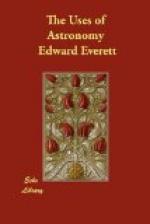Scientificprogress.
You will observe that I am careful to say the progress of science “at home and abroad;” for the study of Astronomy in this country has long since, I am happy to add, passed that point where it is content to repeat the observations and verify the results of European research. It has boldly and successfully entered the field of original investigation, discovery, and speculation; and there is not now a single department of the science in which the names of American observers and mathematicians are not cited by our brethren across the water, side by side with the most eminent of their European contemporaries.
This state of things is certainly recent. During the colonial period and in the first generation after the Revolution, no department of science was, for obvious causes, very extensively cultivated in America—astronomy perhaps as much as the kindred branches. The improvement in the quadrant, commonly known as Hadley’s, had already been made at Philadelphia by Godfrey, in the early part of the last century; and the beautiful invention of the collimating telescope was made at a later period by Rittenhouse, an astronomer of distinguished repute. The transits of Venus of 1761 and 1769 were observed, and orreries were constructed in different parts of the country; and some respectable scientific essays are contained and valuable observations are recorded in the early volumes of the Transactions of the Philosophical Society, at Philadelphia, and the American Academy of Arts and Sciences at Boston and Cambridge. But in the absence of a numerous class of men of science to encourage and aid each other, without observatories and without valuable instruments, little of importance could be expected in the higher walks of astronomical life.
Americanobservations.
The greater the credit due for the achievement of an enterprise commenced in the early part of the present century, and which would reflect honor on the science of any country and any age; I mean the translation and commentary on Laplace’s Mecanique Celeste, by Bowditch; a work of whose merit I am myself wholly unable to form an opinion, but which I suppose places the learned translator and commentator on a level with the ablest astronomers and geometers of the day. This work may be considered as opening a new era in




